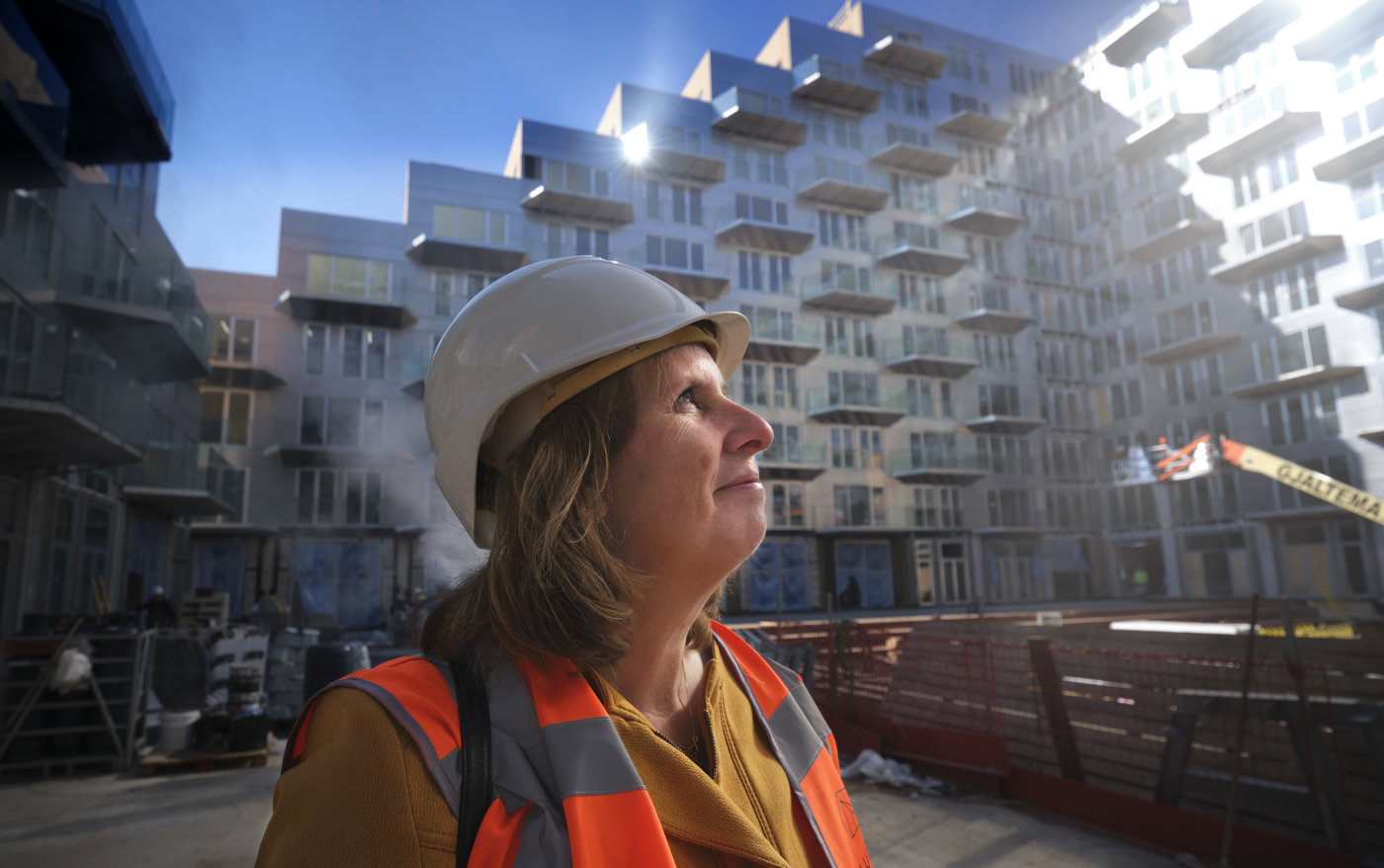She is not averse to paternalism, firmly believes in collectivity and is very supportive of self-employed people and of members who are at their wits’ end: Eline Lundgren, the new chairperson of bpfBOUW.
“I’m more frugal with the pension fund’s money than with my own.”
Picking up bricks with her own hands while renovating her house, that was as far as Eline Lundgren’s personal experience with the construction sector went. That is, until she became the chairman of the bpfBOUW pension fund, the sector pension fund for the construction industry. Because of the corona crisis, until the photshoot she had not yet been to the building site to inhale the smell of cement and have a cup of coffee with one of the 147,020 active participants (annual report 2020).
BpfBOUW is one of the five largest pension funds in the Netherlands, with a total of over 776,000 participants and more than 102 billion euros in invested assets. Lundgren - an experienced pension administrator on behalf of the trade union federation FNV - considered it “honorable, fun and challenging” to be asked to chair such a large fund. Although it was “with pain in her heart” that she had to give up her chairmanship of BPL Pensioen, the pension fund for the agricultural and green sector.
From farmers to builders: what are the differences in pension administration between these sectors?
“First, an important similarity: both pension funds are aimed at providing participants with the best possible income for later in life. But there is indeed a difference: the agricultural sector is faced with a shrinking number of farmers. The number of active participants in the industry pension fund is therefore also declining. This has consequences for the continuity of the fund: with more participants, you can invest better and gain higher returns. By contrast, the construction industry is growing: the demand for construction workers is far greater than the supply. Especially now that the madness on the housing market means that many new homes will be built in the coming years. This is a huge challenge for the sector, but for the continuity of the pension fund, this growth is good news.”
Both sectors are also dealing with the nitrogen and PFAS crisis.
“Both the agricultural and construction sectors face a major sustainability challenge. But even there we are seeing different dynamics. For the agricultural sector, the sustainability policy has mainly negative consequences. For example, the future for pig farmers and farmers around Natura 2000 areas is uncertain. In the construction sector, however, sustainability has a positive connotation: the challenge of innovative and climate-neutral construction.”
The construction industry has many self-employed workers. They often do not accrue a pension. What role do you see there for the pension fund?
“Employees save for their retirement throughout their working lives and therefore have the security of an income for later. I really don’t begrudge self-employed people this either. I also think it’s important for society: one of the pillars of our wonderful society is our good pension system, in which we share risks together. As a fund, we therefore want to make it easier for self-employed individuals to save for their retirement. This would probably not succeed with an obligatory scheme: self-employed people feel like real entrepreneurs and, moreover, paying the premiums is difficult if their income varies. But a voluntary pension scheme might have a chance of success. At bpfBOUW, we are investigating whether and how that might be possible.”
BpfBOUW is the largest Dutch fund to index pensions as of January 1, at 1.76 percent; that’s 68 percent of inflation. Are you happy with that?
“Absolutely. We were one of the last pension funds eight to nine years ago that could still index and now we are one of the first funds that can largely offset the increase in consumer prices. And as a board, we also have full indexation on our minds. We still need to have more discussions about whether and how we are going to do that. In addition, you always have to keep an eye on the premium and the coverage ratio.”
On top of that, the new pension system is coming: what changes will that bring?
“Fortunately, a lot will stay the same. Dutch people will continue to save money for the future, pension funds will still have money in their coffers for everyone, and every participant will continue to receive lifelong pension payments, even if you live to be 124. We will also continue to share the risks with each other: the short and longevity risks, belonging to the generation of bad luck or good luck, the occupational disability risk and the investment risk.”
The latter is the case in the solidary premium scheme, which the social partners at bpfBOUW have provisionally opted for. Why was a flexible premium scheme not chosen, in which members themselves can indicate with which risk profile they wish their pension contributions to be invested?
“In the solidarity contribution scheme, you have a larger pot to absorb investment risks and the returns will ultimately be slightly better. For the lowest possible premium, you get the best possible benefit in return. What’s more, you share the differences between generations that are going through worse or better economic times, between the unlucky and the lucky. That’s what I feel most comfortable with. I am a fervent supporter of the idea of collectivity; I firmly believe in the principle of solidarity.”
